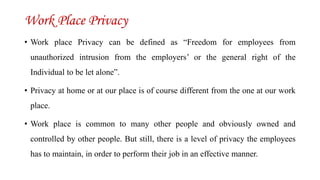performance management- work place stress.pptx
- 1. Work Place Privacy ŌĆó Work place Privacy can be defined as ŌĆ£Freedom for employees from unauthorized intrusion from the employersŌĆÖ or the general right of the Individual to be let aloneŌĆØ. ŌĆó Privacy at home or at our place is of course different from the one at our work place. ŌĆó Work place is common to many other people and obviously owned and controlled by other people. But still, there is a level of privacy the employees has to maintain, in order to perform their job in an effective manner.
- 2. The major issues of work place privacy and its violations are as follows: ŌĆó Electronic surveillance and Video Monitoring of employees at work place ŌĆó Monitoring of emails (including personal emails) of the employees through the office server system ŌĆó Tapping of phone calls of employees during office hours ŌĆó Credit check on employees ŌĆó Seeking personal information of employees
- 3. ŌĆóIn USA, invasion of privacy is considered to be a major infringement of individual rights. ŌĆóIn India, the MNCs and industries with western ties like BPOs, KPOs and Software companies are the major users of softwares to monitors the employees. ŌĆóThe popular softwares like ŌĆ£spector softŌĆØ and ŌĆ£VPI empower suiteŌĆØ are available in the market which are specially designed to monitor the desktops and phone calls of employees in the organisation.
- 4. On the other side of the coin, employers justify the surveillance or monitoring by stating the following reasons: ŌĆó Monitoring employees helps identifying genuine and honest employees ŌĆó Surveillance improves productivity ŌĆó It helps in keeping a check on thefts in the organisation ŌĆōmay it be materialistic or knowledge data base ŌĆó When employees know that they are under observation, they try to act cordial and amicable to co-workers and conflicts are reduced ŌĆó Cuts out the misuse of internet facilities & Cuts our computer slack time ŌĆó Keeps the misuse of company resources
- 5. ŌĆó we cannot say altogether that monitoring the employees is wrong. ŌĆó As in the present scenario, where technology rules and day- by- day new softwares are invented to do millions of things from your desk top, the concern over the sustainability and reputation of the organisation becomes vital. ŌĆó The employees, particularly those who have negative thoughts about the organisation, may misuse the organisations possessions or name to damage them. For instance, let us imagine a scenario.
- 6. ŌĆó An employee who is in cash transactions of a financial company may use the company email id to create a rumour about funds manipulation in the company. ŌĆó There may be investigations later, may be the culprit gets punishment, but the damage done will be irrevocable. Once the goodwill and the reputation of the financial company gone, itŌĆÖs gone forever. ŌĆó If there is a surveillance system to monitor the emails, this problem would have been stopped before happening.
- 7. ŌĆó Apart from the data base security concerns, the work time wastedin internet surfing is also a major issue in work place monitoring. ŌĆó An article from IIM, Bangalore mentions that approximately 8 lakh rupees is calculated to be wasted on cyber slack time by a software engineer in India.







